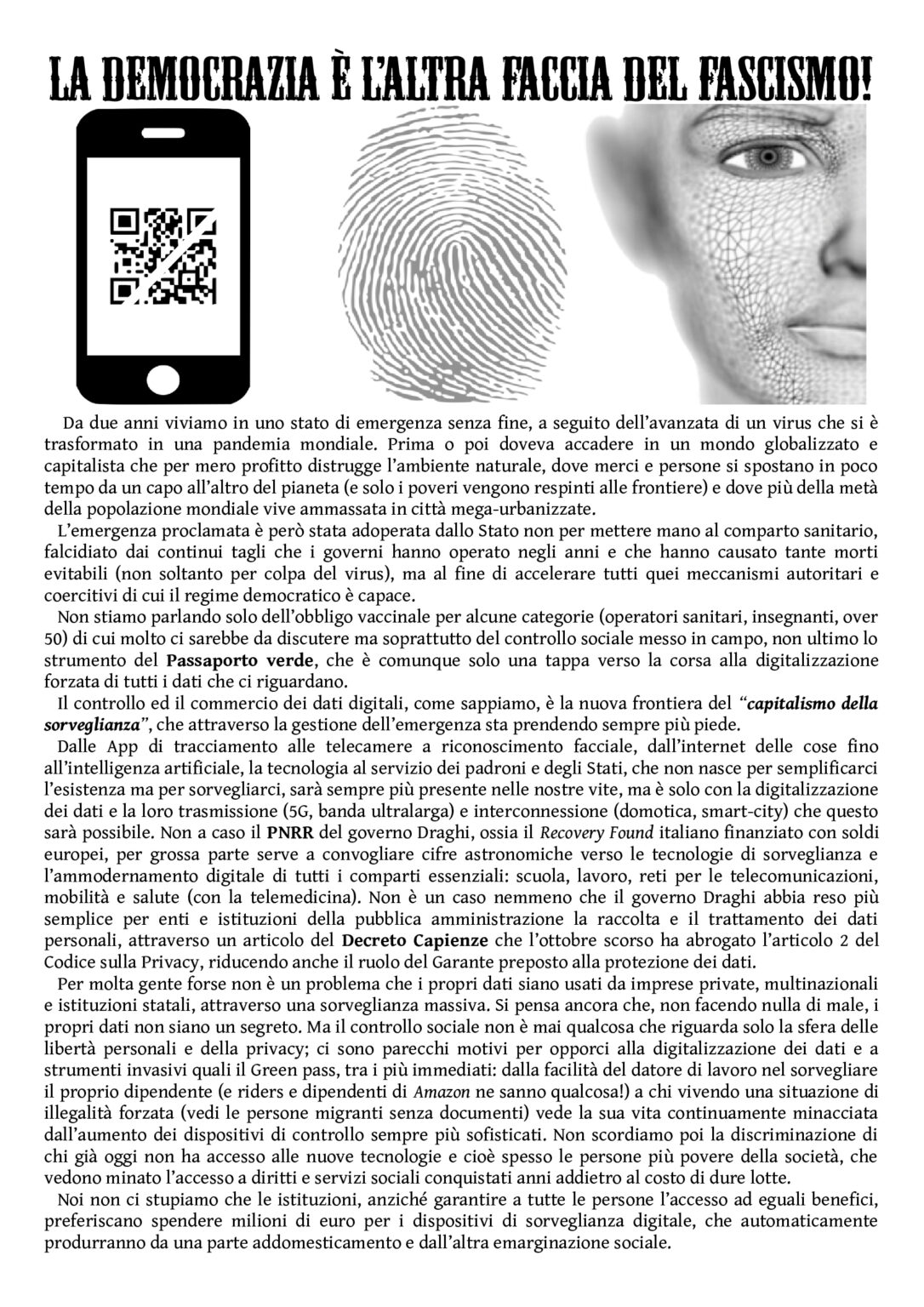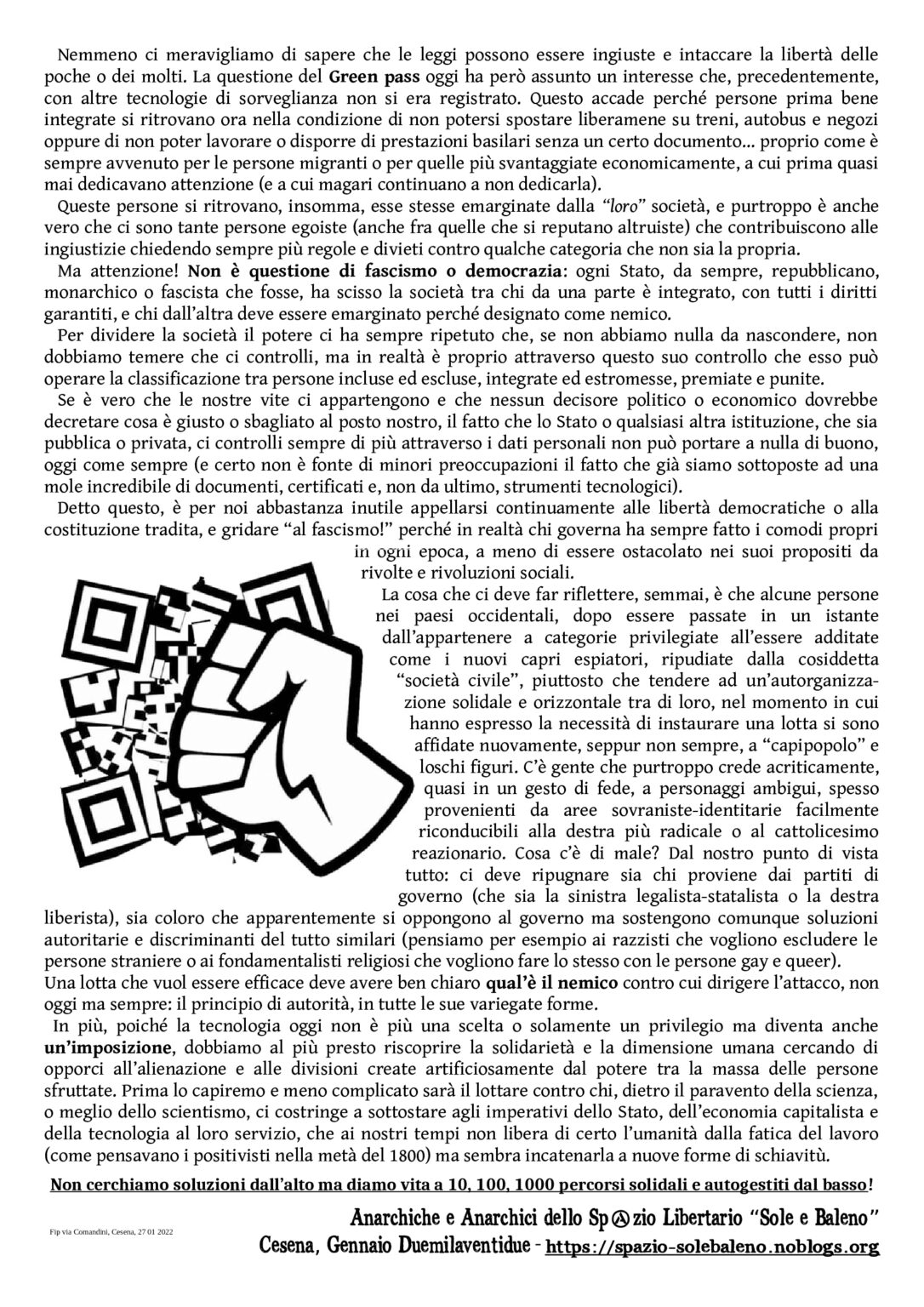
DEMOCRACY IS THE OTHER FACE OF FASCISM
Since two years we live in a state of emergency without end, following the advance of a virus that has become a global pandemic. Sooner or later it had to happen in a globalized and capitalist world that for mere profit destroys the natural environment, where goods and people move in a short time from one end of the planet to another (and only the poor are rejected at the borders) and where more than half of the world’s population lives crowded in mega-urbanized cities.
The emergency proclaimed, however, has been used by the state not to put hand to the health sector, decimated by continuous cuts that governments have made over the years and that have caused so many preventable deaths (not only because of the virus), but in order to accelerate all those authoritarian and coercive mechanisms of which the democratic regime is capable.
We are not only talking about the compulsory vaccination for certain categories (health workers, teachers, over 50) about which there would be much to discuss, but especially about the social control put in place, not least the instrument of the Green Passport, which is still only a step towards the race to forced digitization of all the data that concern us. Controlling and trading digital data, as we know, is the new frontier of “surveillance capitalism,” which through emergency management is gaining momentum.
From tracking apps to facial recognition cameras, from the internet of things to artificial intelligence, technology at the service of masters and states, which was not born to simplify our existence but to monitor us, will be increasingly present in our lives, but it is only with the digitization of data and their transmission (5G, ultra-wideband) and interconnection (home automation, smart-city) that this will be possible. It is no coincidence that the PNRR of the Draghi government, the Italian Recovery Fund financed with European money, for a large part serves to channel astronomical sums towards surveillance technologies and the digital modernization of all essential sectors: school, work, telecommunications networks, mobility and health (with telemedicine). It is also not by chance that the Draghi government has made it easier for public administration bodies and institutions to collect and process personal data, through an article of the Capienze Decree that last October abrogated article 2 of the Privacy Code, also reducing the role of the Guarantor in charge of data protection.
For many people perhaps it is not a problem that their data are used by private companies, multinationals and state institutions, through massive surveillance. People still think that because they do nothing wrong, their data is not a secret. But social control is never something that concerns only the sphere of personal freedoms and privacy; there are several reasons to oppose the digitalization of data and invasive tools such as the Green pass, among the most immediate: from the ease of the employer in monitoring his own employee (and riders and Amazon employees know something about it!) to those living in a situation of forced illegality (see undocumented migrants) who see their lives continuously threatened by the increase of increasingly sophisticated monitoring devices. Let’s not forget then the discrimination of those who already today do not have access to new technologies, that is often the poorest people in society, who see their access to rights and social services undermined, conquered years ago at the cost of hard struggles.
We are not surprised that institutions, instead of guaranteeing all people access to equal benefits, prefer to spend millions of euros on digital surveillance devices, which will automatically produce domestication on one hand and social exclusion on the other.
Nor are we surprised to learn that laws can be unjust and affect the freedom of the few or the many. However, the issue of the Green Pass has today taken on an interest that previously had not been registered with other surveillance technologies. This happens because people who used to be well integrated now find themselves in the condition of not being able to move freely on trains, buses and stores, or of not being able to work or provide basic services without a certain document… just as has always happened to migrants or the economically disadvantaged, to whom they used to pay almost no attention (and to whom they may continue not to pay attention).
These people find themselves marginalized by “their” society, and unfortunately it is also true that there are many selfish people (even among those who consider themselves altruistic) who contribute to injustice by demanding more and more rules and prohibitions against some category other than their own.
But beware! It is not a question of fascism or democracy: every state, whether republican, monarchical or fascist, has always divided society between those who on one side are integrated, with all the rights guaranteed, and those who on the other side must be marginalized because they are designated as enemies.
In order to divide society, power has always told us that if we have nothing to hide, we should not fear that it will control us, but in fact it is precisely through this control that it can operate the classification between people included and excluded, integrated and excluded, rewarded and punished.
If it is true that our lives belong to us and that no political or economic decision maker should decide what is right or wrong for us, the fact that the State or any other institution, whether public or private, controls us more and more through personal data cannot lead to anything good, today as always (and certainly it is not a source of less concern that we are already subjected to an incredible amount of documents, certificates and, not least, technological tools).
Having said that, it is quite useless for us to continuously appeal to democratic freedoms or to the betrayed constitution, and to cry “to fascism!” because in reality those who govern have always done their own thing in every age, unless they are hindered in their intentions by revolts and social revolutions.
The thing that should make us reflect, if anything, is that some people in Western countries, after having passed in an instant from belonging to privileged categories to being pointed out as the new scapegoats, repudiated by the so-called “civil society”, rather than tending to a solidarity and horizontal self-organization among themselves, when they expressed the need to establish a struggle they relied again, though not always, to ” popular leaders” and shady characters. There are people who unfortunately believe uncritically, almost in a gesture of faith, to ambiguous characters, often coming from sovereign-identity areas easily traceable to the most radical right or to reactionary Catholicism. What’s wrong with that? From our point of view everything: we must repugn both those who come from the parties of government (be it the legalist-statist left or the liberalist right) and those who apparently oppose the government but support authoritarian and discriminating solutions that are very similar (think for example of racists who want to exclude foreign people or religious fundamentalists who want to do the same with gay and queer people).
A fight that wants to be effective must be clear what is the enemy against which to direct the attack, not today but always: the principle of authority, in all its various forms.
In addition, since technology today is no longer a choice or only a privilege but also becomes an imposition, we must as soon as possible rediscover solidarity and the human dimension by trying to oppose the alienation and divisions artificially created by power among the mass of exploited people. The sooner we understand this, the less complicated it will be to fight against those who, behind the screen of science, or rather of scientism, force us to submit to the imperatives of the state, the capitalist economy and the technology at their service, which in our times certainly does not free humanity from the toil of work (as positivists thought in the mid-1800s) but seems to chain it to new forms of slavery.
We do not seek solutions from above, but let’s give life to 10, 100, 1000 solidarity and self-managed paths from below!
Anarchists of the Libertarian Space “Sole e Baleno”
Subborgo Valzania 27, Cesena, January Two Thousand and Twenty-two

Source: Inferno Urbano
